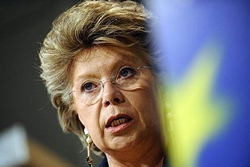Europe's online source of news, data & analysis for professionals involved in packaged media and new delivery technologies

EU agrees on illegal downloader crackdown, Internet users' rights
In a compromise deal announced by EU Telecoms Commissioner Viviane Reding (pictured), the European parliament has agreed new rules that balance a crackdown on illegal downloaders with broader rights for Internet users. It also offers more protection against illegal Internet porn and copyright abuse.
Following pressures from the parliament, the future rules state that any national measures regarding restrictions to access to Internet services and applications must be "appropriate, proportionate and necessary within a democratic society." Governments would no longer be able to cut off Internet services to users without providing evidence of illegal downloading or other activity.
.
An earlier bill had been rejected by the parliament amid uproar over a draft French anti-piracy law which had suggested that Internet connections of users of peer-to-peer services could be cut without the prior intervention of judicial authorities.
The revised deal stresses that "citizens in the EU are entitled to a prior fair and impartial procedure, including the right to be heard, and they have a right to an effective and timely judicial review."
Other elements of the new telecom bill spells out rules on switching mobile or fixed phone providers as well as ensuring that European consumers have an "ever greater choice" of competing broadband service providers.
Lord Mandelson, UK Secretary of State for Business, Innovation and Skills has announced this week that the UK will be adopting the controversial 'three strikes' Internet piracy law, disconnecting multiple time offenders from the Internet while levying heavy fines.
The government added that first time offenders will likely be given a warning, then have their bandwidth restricted after a second offense. Third strike means being disconnected from the Internet, or at least "considered" for disconnection given the crime.
The law will come into effect April 2010, says the Department for Business, Skills and Innovation. Ofcom, the communications watchdog, will be in charge of monitoring the file-sharing of UK citizens.
Story filed 09.11.09




















